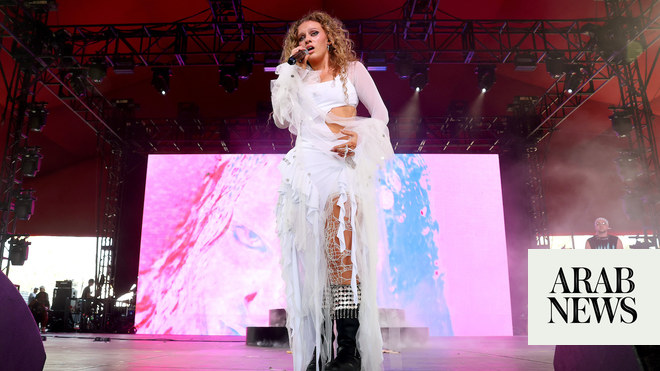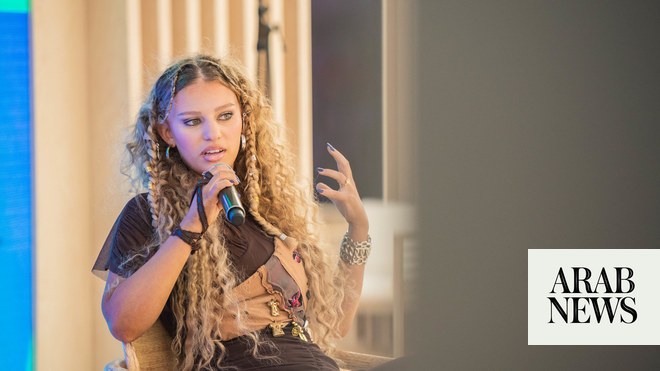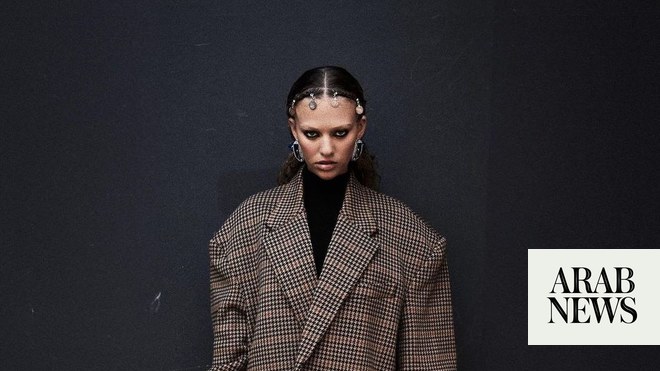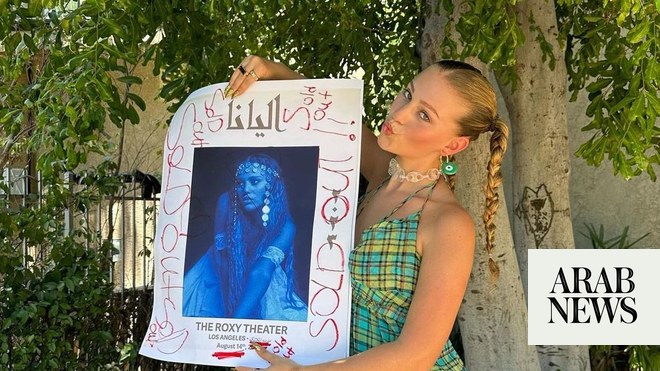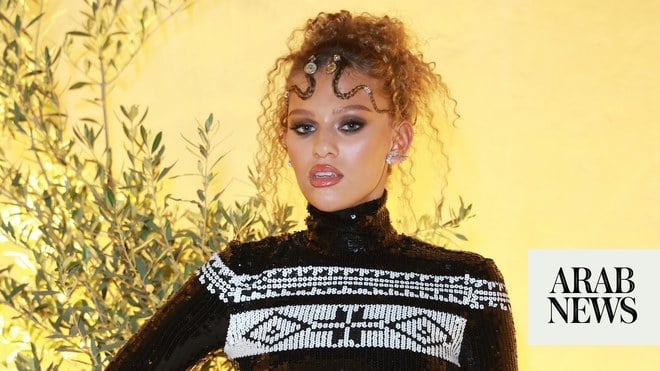
One typically doesn’t expect good crowds for a 2pm music festival set. But on a crisp summer day at New York’s Governors Ball this past June, Elyanna, a Palestinian-Chilean singer pioneering an experimental Arab-Latin pop sound, drew a rapturous cohort at the main stage.
Swaddled in angelic white lace, honeyed hair braided with gold coins, the 22-year-old courted a crowd full of Palestinian flags in English (“We have gen Z shaking the floor!”) but sang almost entirely in Arabic. The effect of her ambitious blend – Arab pop, EDM, American jazz, Latin rhythm, traditional Middle Eastern instruments, the insouciance of Rihanna and bellydancing reminiscent of Shakira – was mesmerizing. I looked away just once in 45 minutes – enough to see that she had magnetized a good portion of the festival to the set, new listeners come to witness a star ascendant.
By the end of the month, Elyanna – born Elian Marjieh – was on the main stage at Glastonbury, assisting with Coldplay’s track Arabesque during the band’s headliner set. Shortly after, she announced her first world tour in support of her debut album Woledto (I Am Born in English), featuring certified bangers Ganeni (Make Me Crazy) and Al Sham, an ode to the Algerian singer Cheikha Rimitti and Levantine heritage. Born and raised in Nazareth, Elyanna has become used to bringing Arabic, and overt celebrations of Palestine, to places that generally don’t know the language. She became the first Arabic-language performer at Coachella in 2023; in May, she made her television debut on the Late Show with Stephen Colbert as the show’s first Arabic-language performer, singing Callin’ U (Tamally Maak), a bilingual interpretation of several international classics, and Mama Eh (Mama What) while pointedly donning a keffiyeh, a traditional Palestinian cloth that has become a symbol of resistance to Israel’s war on Gaza.
And she’s accustomed to skepticism at trying to break into an English-language market with unapologetic and undiluted nods to her heritage and language. “A lot of people doubted, because they don’t understand it,” she told the Guardian. “You gotta teach people. You gotta teach them to love something new, something that they’ve heard. Because I’ve seen Arabic music around. I’ve seen it in production and I’ve seen it in melodies and runs that people do, but it was never claimed.
“It’s time for our culture to push it in a way where it’s claimed and people talk about it and we just put it up there in front. It’s time.”
Over Zoom, the singer is much looser than her flirty, sirenic on-stage persona. Chatty, warm and low-key – loose double braids, teal halter top, no makeup, clutching a gifted Late Show mug – she speaks in flowing, casual and self-deprecating English, honed from a childhood listening to English-language singers and a brief, formative stint in American high school. Her influences have always been far-flung and disparate: her mother, a Palestinian poet; her maternal grandfather, a performer of zajal – Lebanese folk poetry – at Palestinian weddings; her paternal grandmother, a pianist in Viña del Mar, Chile, where she used to visit frequently as a child. Her father introduced her to a variety of musical styles: Julio Iglesias, the Syrian singer George Wassouf, Etta James, Aretha Franklin, Egyptian legend Umm Kulthum. “There is no connection in all the music I listen to, but I think that’s what makes my sound right now,” she said. “It’s a bunch of things combined, to feel like its own unique thing.”
But home is always Nazareth, the Arab capital and center of Palestinian nationalism in the state of Israel, which she left at 15 to pursue music. “This is my home, this is my culture,” she said. “There’s so much that I learned from where I come from, which inspires me right now, even when I live in LA.” The dream, starting at age seven, was just to sing – any language, any style, any where. “I just really loved music, and I just wanted to be an artist and a performer,” she said. Her older brother Feras, a musician, pushed her to perform in Nazareth. The career was and still is a family project – Feras is her creative director and producer, her mother is her co-writer, sister Tali her stylist; her song Sad in Pali features her grandfather’s zajal poetry. “We design from scratch and we take our time,” she said of the tight unit. “They’re probably working on my Lollapalooza fit downstairs.”
Nazareth offered limited opportunities for the dream – “It felt impossible,” she said. “Everybody would ask me like, ‘Who do you wanna be?’ And I’m like, ‘I wanna be a singer.’ And everybody’s like, ‘What?’ It’s not a thing back home.” So the family emigrated to the US, settling in San Diego in 2017. Elyanna attended Torrey Pines high school, just north of the city, as a sophomore, for a “tough” two years. Her English wasn’t great; her classmates either didn’t know or didn’t get her aspirations. “I just had to figure things out, and I just had to be alone at lunch,” she said. “I was there in my shell.” She began gathering a social media following for covers of Rihanna and Amy Winehouse. By 17, she was in LA, where she met the Canadian producer Nasri, who also has roots in Nazareth; he connected her with the Lebanese Canadian studio executive Wassim “Sal” Slaiby, a collaborator with The Weeknd, who signed her to Universal Arabic Music, a label he launched partly for her – and, crucially, convinced her to sing in Arabic.
While Spanish-language music was making in-roads on English-speaking charts, with crossover stars in Bad Bunny and Rosalía – Elyanna echoes their voracious blend of influences – the lane for Arabic was wide open. “When I first started, there was none of that. It didn’t really exist. There was a lot of people that loved the culture, and there were a lot of executives like my manager … but there was just a missing piece,” she said. Breaking in followed a long line of trailblazers. “It takes an army to do this,” she said. “It has to be multiple people that have that vision and can see where this could go.”
Her rise is especially bittersweet, as it coincides with the devastating violence of Israel’s war on Gaza and intensifying oppression in the West Bank. In response to the outbreak of the war last fall, Elyanna postponed her US tour. Earlier this year, she collaborated with Paliroots, co-designing, with her brother, gear emblazoned with “albi falastini” (“My heart is Palestinian”); all proceeds went to Gaza via Middle East Children’s Alliance. This spring, she performed at Brown University amid widespread pro-Palestinian campus protests, to a crowd dotted with keffiyehs. At Governors Ball as in other concerts, she performed Olive Branch, her ode to peace in her homeland, in front of an English-language graphic: “All Eyes on Rafah,” the southern Gazan city besieged by Israeli forces, and now an internationally condemned humanitarian crisis.
“My set in general is very Palestinian-inspired. It’s my culture,” she said. “It just makes me happy how much this grew and how many people support Palestine and show love to Palestine. We need it. Our people back home, they need this.”
She prefers to speak through the music – “Through distance, you’ll learn the meaning of togetherness,” she sings in Sad in Pali, reciting a poem by her mother. “Through distance, your heart will learn the meaning of drought / And your heart will learn the taste of return / After the wait.” She does not shy away from championing the Palestinian people. “I’m an artist and I have a message and I am very, very proud of my culture and I’m very passionate about my culture,” she said. “What I believe in is very clear. It’s because I know how much talent and I know how rich our culture is. And I know that our people deserve love and they deserve to be heard. So it feels like a relief, that I feel like I’m spreading my message as an artist and I use my music to send a message.”
“That’s what artists do,” she added. “We should speak our minds and spread love and spread a message that means something.”




